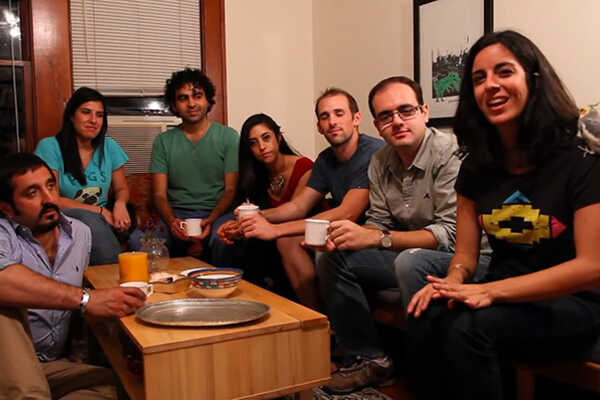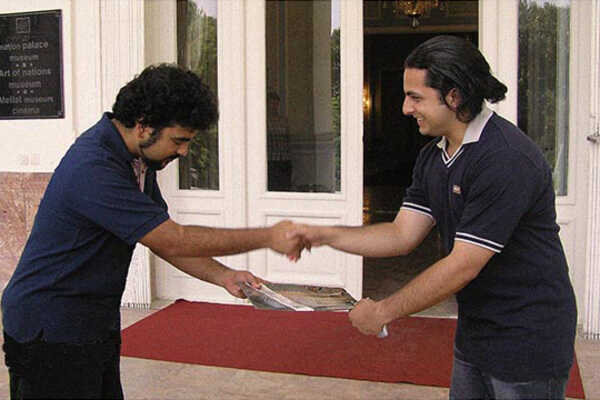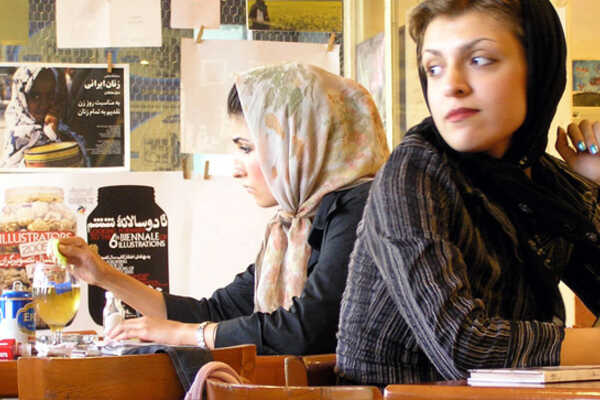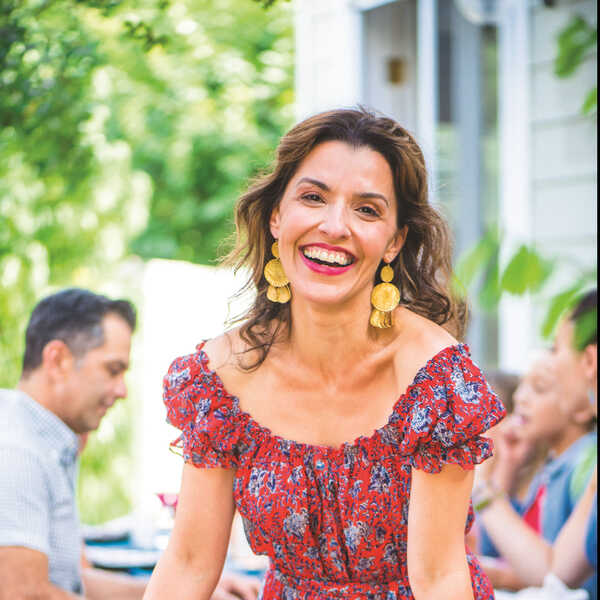
Raising Neem-Roonis- An Interview with Naz Deravian
Raising Neem-Roonis is an interview mini-series featuring Iranians in the diaspora that are married to non Iranians and raising half Iranian children (hence the term neem (half) Rooni (Iranian)). Throughout the series, we explore the challenges and unique opportunities presented by raising half Iranian children, with topics ranging from raising kids to be bilingual in Persian (or not) to different aspects of Persian culture that should be passed on to the next generation (or shouldn't).
Our first interview for the Raising Neem-Roonis series is with actress turned cookbook author Naz Deravian. In addition to the wonderful recipes, her fantastic Persian cookbook Bottom of the Pot is full of anecdotes and examples of sharing Persian food (and sometimes cooking) with her American husband and Neem-Rooni children and, in the process, familiarizing them with Iranian culture. After becoming enamored by her recipes and writing style, I had so many questions for her about her views on the role of culture when it comes to having a family and raising children.
Listen to the full episode to hear Naz's thoughts on how to keep children interested in the Persian language/culture (and whether or not it's even important to do so), the role of food in culture, and a range of other cultural topics, or check out some of the highlights from the interview below.
(Note: To celebrate the launch of this podcast episode, we are doing a book giveaway of five copies of Bottom of the Pot. You can enter on April 22nd, 2020 through 12pm CST April 24nd, 2020 either through our Instagram page or our Facebook page)
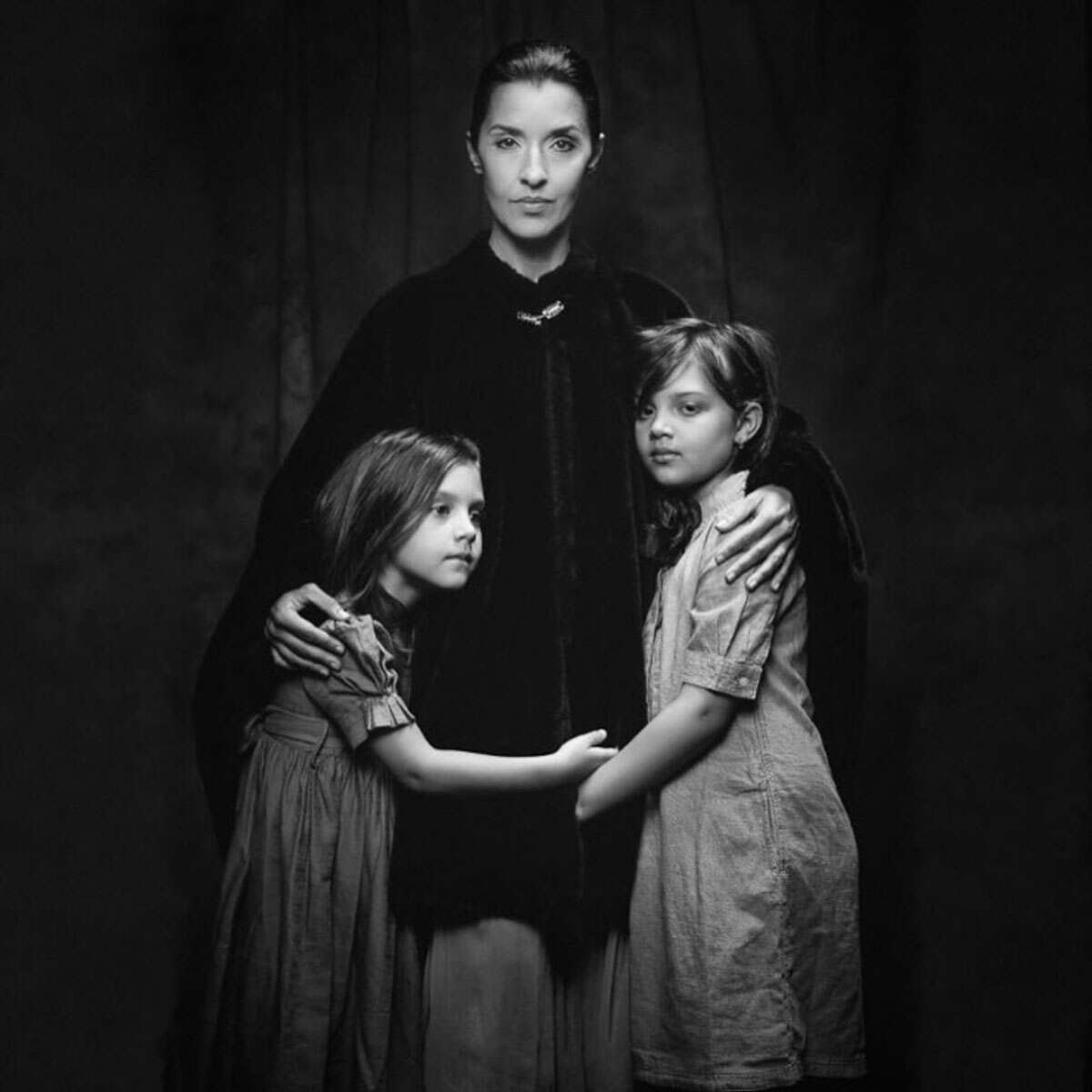
Photo of Naz and her daughters, taken by Ramin Deravian
Leyla: You were born in Iran. How old were you when you left? Where do you live now?
Naz: I left when I was eight years old. We first moved to Rome, Italy, and we were there for a couple of years. I was 10 years old when we immigrated to Vancouver. And then once I graduated from university, I moved down to LA. I've been here in the states in Los Angeles since, so I've actually lived in LA long now longer than I have lived anywhere else in my life, which I never thought I would say.
L: What's your proficiency with the Persian language?
N: I was in Iran those first couple of years of primary school. Persian was like our second language class, so we had about an hour a day. And then, there was the tumult and chaos of leaving and immigrating. Persian was put on the backburner in Italy as well. I went to an American School for the time that we spent there and then Italian was my second language there. But my parents had originally met in Italy, and my older brother was born there. So Italian was a language that I was quite familiar with. But then once we moved to Vancouver, one of the jobs my mom started was teaching Persian to kids. So I was part of those classes. I would say I studied up until fifth grade. And then, probably like any other young person, I rebelled. I didn't want to carry on. And now I highly, highly regret it.
L: What cultural background is your husband? Where did you meet him?
N: I met my husband here in Los Angeles. We were both actors at the time, and we'd been doing a show together. He's from the Bay Area born and raised American, white American. So he only speaks English. I shouldn't sell him short.
L: I've seen him turn over that tah deeg. So he's doing really well.
N: That's just it's the type of person that he is. He loves our culture. He loves our food. He gets it- all the good and the bad with every culture. And at our wedding, actually, he did this very sweet thing where he worked with my mother on the side without me knowing. And they translated my favorite Tom Waits song. He stood up and recited it in Persian.
L: That is really sweet! And you have two daughters and and their what are their names and ages?
N: My daughter Luna is 13 and Soleil is 10.
L: Okay, and so here's our big question of this series- how is their Persian?
N: So... not great. I've talked to other Iranian friends and we try not to beat ourselves up about this. That's the first thing that I would try to put out there. Let's be good to ourselves because there's enough bad happening. I don't need to beat myself up about this, but I do.
With Luna, my eldest, I had all the right intentions. I was going to speak Persian to her and my husband Drew was fully on board. And I remember meeting with a pediatrician and she just said this is a gift that you will give her and I know that multiple languages in my young life was gift that was given to me obviously. I'm now hopefully fluent in English, I do okay with Persian and I have a little bit of Italian and a little bit of French from Canada, having gone to school there. So this was the path that I was going to start my children on. And with Luna, the first couple of years I did quite well. When we were alone, I would only speak Persian to her, and then when Drew was home, I went back and forth. I know that you're technically not supposed to do that- one parent should stick to one language. But you know what? We were living our lives. We were new young parents. I did the best that I could. Then once Soleil was born, I tried to stick with that. And then I don't know what I can blame it on, maybe fatigue, but it went out the door. I just switched mostly to English, but then all the terms of endearment to this day are in Persian. I will still speak but they're not fluent by any means of the imagination. When Luna was around five years old, we got her a Persian teacher, a lovely woman who would come over, and she was learning how to read and write. And and then after a couple of years, we weren't able to keep up with that either. Right. So there you have it.
L: Well, so this is this is very common. I think that that's what I'm hearing most often when I ask people this question. I moved to the states when I was four years old. Very similar to you, my mom taught, she had the first Persian language class for kids in the Dallas area. And so I went to her classes and same thing- I got up to the fifth grade level, but my secret weapon that I always tell people when they ask me is grandparents. I grew up in the same house as my grandparents. And so I'm sure I would have rebelled against my mom and only spoken English, but because my grandparents couldn't speak English, I had to just keep speaking Farsi. I always thought I will be so strict with my kids, I'm going to teach them. I have a 10 month old now and a three year old. And what you're saying is exactly what I'm going through right now with the first one. I spoke to him in Persian all the time when we were alone. But when my husband's around, I think it's more important for us to be a family and to talk and be able to understand each other, rather than to be really strict and just speak Farsi. So now that the second one's here, I can just see us going on the same path.
N: Don't let that happen!
L: You think so? Well, that that's what I'm wondering. Do you think it's that important that we teach the language?
N: Here's a great point that you made. We don't have any family around. My mom is in Vancouver and my dad was in Vancouver, he's passed away. My brother is in Toronto. So I think it really would have made a difference if a set of grandparents on the Iranian side lived here. I think that my mom would have just spoken in Persian them the whole time. And that would have helped me as well. I think that's one of the issues is that if you don't have a lot of family around, you feel even more isolated. Most of our friends here in LA are not Iranian. But they still love our food.
So you know, we don't have that access to people coming and going and speaking the language. Having said that, I was raised in a family that always valued a second or third language, no matter what that language. We were always told that it will help us later in life. It's a great skill to have. And I agree with that, especially these days. We're such a global world now that I think one of the issues I have with the American schools is that a second language is introduced so late. You know, it's sometimes in middle school, if not in high school, and it's too late by then. You know, I think it's much easier for kids to start in kindergarten. Your brain is able to process it much faster and easier. So and I have to say, my kids will ask me now they want to learn right now. So we are working at looking at how we can do that. For me at this point, I'm not a great teacher, because I'm their mother. And I'm not sure how well that would work. But I can do my part. And what we have started doing is all randomly, I'll just start speaking to them, or I'll point to colors. You know, the way that I learned English, just open coloring book and saying, this is ābee, this is ghermez and just repeating these things. Are they going to be fluent? And will they be scholars at it? Perhaps, if they want to, but at the very least they'll have maybe they'll have some basic understanding of it. At the very least I know that for your kids and my kids these specific sounds will not be alien to them.
L: Right, exactly. So they'll have some sort of basis. They've heard it they when they want to pick it up and then when they have an interest they'll probably be able to pick it up really quickly.
N: I think so. And I remember one thing I did with both girls, when they were like, from the time they were babies, I'd walk around, say ghormé sabzee, khodāfez, ghaymé. Just to get those sounds.
L: People ask me this all the time, and I just don't have the answer. And I feel like it's too bad because all of us who are our age, we have that regret of not of our parents not being strict or with us, but then when it comes to our kids, it's just so much easier said than done. It just becomes very difficult and they're so stubborn.
N: It really is. I think there's a fine line between forcing them and then for them to just despise it. I don't want that to happen. And I don't think, speaking for myself, that that's happened.
L: In what other ways are you passing on the Persian culture? If you can talk about your perspective in terms of food?
N: Yes. So obviously food, right? It's the easiest way for me and I think for a lot of people because if it tastes good, then you want to know more about it. One thing I used to do with the girls, because I probably had read somewhere in a parenting article or something, I would just stick these spices under their noses. Just to know this is zarchoobé- this is turmeric, zafarān (saffron).
Also, they are fully aware of my journey. It's a complicated journey, and not an easy story. It's not a black and white story, with words like immigration and revolution. All of that will come up at some point and we very frankly talk about it, obviously, in an age appropriate manner, especially recently with Iran being in the news once again.
What I'm really proud of these kids- and I think it might speak to this newer generation- is that any feelings that I might have had about revealing where I was from when we first moved, which was directly after hostage taking and all of that- they don't. They say it very normally- I mean proud, but not in a show offy kind of way. They say they're half, they're half American, they're half Iranian, and Canadian. So that makes me very proud. And then, having their non Iranian friends over and again, food can be one of the ways. And it was the way I connected to my new Canadian friends. Introducing their friends to this food and then it opens up a conversation about, 'Oh, where's your mom from?'
Also, celebrating nowruz. And again, I don't even know what traditional means anymore. And the word authentic- we've created our own traditions. We set up our haftseen. Now, do we go about every tradition as it's done in Iran? I don't know anymore. These things get passed down and they will change and they will bend with a generation. And I'm okay with that.
L: You are in LA. So, there's a big community of people around you that do all these things. Is that helpful with traditions like nowruz?
N: There is a very big community, but I don't live anywhere close. LA is really huge. But yes, around nowruz we will go to the stores and the markets and do our shopping. For chahār shanbé sooree, there's one beach where you can actually like make bonfires. We do go and we take the girls friends and they enjoy it. We try to explain why we're jumping over fire and don't get burned please. Except last year we started what we think might be a new tradition. Getting down to the beach gets so crowded. So we just lit little fires in our carport, jumped over the candles and that was really fun too. And that's in the spirit of it and that's really how it's done too. It's in people's neighborhoods.
L: The thing that you said about the spices is interesting because that's another question. In general everybody is wondering how to get their kids interested in food with different flavors. And I think that's a really nice idea to have them have this very varied palette from the beginning. And you know, Iranian food does that really well.
N: Yes. And I would suggest leading with the name of the dish in Persian. You can describe it but just say this is called ghormé sabzee or, you know, this is called fesenjoon and they'll still stick.
L: Right. And do they help you with the cooking as well? Is that another part of your family?
N: I make them help with setting up the table and clearing the table and all that. But my 10 year old she enjoys cooking. She'll make the māst ō kheeyār and they'll both taste the food- it's very important to get those taste buds going. You just hope that somehow through osmosis all these scents and flavors will seep in and when it's time and they're interested and when they moved out and desperately need to make some Persian food, they can either pick up my book or pick up the phone and make it themselves.
L: Well, so moving back to culture- can you think of any important things in Persian culture that you are passing on that might be different than Italian or American culture? What cultural aspects are you trying to pass on to your children?
N: I would say our incredible gift of being generous hosts and accepting and that the door is open. And anyone can join us at the table and will always have a seat. That is one that if nothing else, if my girls can be kind, generous, loving human beings. And also loud. We are loud and it's okay to be loud. Make yourself heard yourself.
L: Was your husband like that as well? Or is it something that he's getting used to now?
N: There are days where he'll ask me why I'm shouting. I'm not shouting. I'm just really passionate about this when I shout. And the girls will look at me like, yeah, you're shouting.
L: What about things from the culture that you're purposely not passing on?
N: Well, the concept of tarof- that's a hard one to explain. And you either innately understand or don't. There's this art to it. And I do like it to a certain point, but then there are times where you need to be clear, especially when here people that aren't going to pick up on those cues. Do you want this? Or do you not want it? Because I don't know what to do. Also for them, I need them to be able to shift as I have. So if you are and I are in the presence of certain elders, certain behavior might not be okay. It's just having an awareness and being able to shift and reading the room. But still be yourself. Stand up for the things that you believe in.
L: I think for you probably this question is a little bit different because your family was this very flexible international family. I think there's just some stereotypes of Iranian culture that if I ask that question, a lot of people are like, Oh, yes, this is something from when I was young that my parents forced on me, and I will not do that for my children.
N: Yes, it's very true. And I've had this conversation multiple times. And it's just each time I'm reminded that I was raised in a very open minded family. That's not the stereotypical, quote unquote, Middle Eastern Iranian family that wants everyone to be doctors, lawyers and engineers. Now, my parents did set very high expectations of us and we had to meet them. Education was key. But at the same time, I went to theater school. I'm an actor. And my brother currently is a photographer, although he did go to engineering school. But these things were not frowned upon. We weren't black sheep of the family. My mom is a very well known famous poet.
L: There are a lot of us in the diaspora who are not in Iran anymore. And you know, we've we've grown up here- what is your hope for us moving forward? Many of us are doing projects about Iran or moving back to our roots. I don't know if this has a very clear answer. But what is your hope for the future? Why are we doing all this work?
N: It warms my heart that we've reached this point, actually, because when I first moved we certainly weren't. And to have so many Iranian voices out there, doing so much and achieving so many different things. My hope is that we get to a point where we don't have to point these things out. So we don't have to say, look at this Iranian just did this. I hope we can get to a place where of course, we did. And we can celebrate it. It's not an anomaly because it's not.
L: Right. Actually when I received your book, I hadn't heard of it before before. I thought, that's crazy for something like this to have slipped me by. It's a big achievement. I feel like a few years ago it would have been on my radar but there's so many amazing things out there now. But I did think that was a little bit of a turning point for me. I thought, wow, there are Iranians doing amazing things that I don't know about.
N: It really is. It really is one more point of what can we do? I think it's we are such a divided people. Whether It's in the diaspora or inside and I can't speak to anything inside Iran. I haven't been back. My hope is that one day we will find that bridge a little bit closer.
L: Right. Wonderful.
N: And On a final note, the Tom Waits song is San Diego serenade. And I suggest you lead out with that.
L: Okay, sounds good. Well thank you so much for talking with us.
N: Thank you, it was fun.
To find out more about Naz:
Check out her book Bottom of the Pot, and her blog of the same name. And check out San Diego Serenade by Tom Waits as well.
